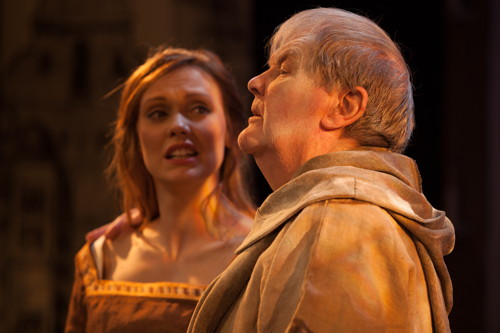Fair Em at the Union Theatre
This modern world premiere of a play once (wrongly) attributed to Shakespeare is entertaining in itself. But its illumination of the genius of the world's most famous Bard provides the greatest appeal.

When is a disputed Shakespeare not a disputed Shakespeare? When the director states categorically in his foreword that he believes 'with some certainty' that it contains little or nothing written by Shakespeare. The word 'disputed' is used in publicity material merely to grab our interest, draw the audience in, lead us to believe that we are about to witness a hidden gem; the play itself must then do the rest.
In summary, William the Conqueror goes in disguise to Denmark to woo the King's daughter. Upon arriving, he realises that she is not the fair maiden that he had been led to believe, and he promptly falls for an already betrothed princess. An unrelated plot runs in parallel: an aristocratic lady, disguised as a milliner's daughter, goes to extreme lengths to deter her unworthy suitors. The two storylines are brought together at the conclusion of the play in a rather forced and unsatisfactory manner.
The fact that the plot can be summarised with such brevity marks this out as a non-Shakespeare play. Equally, the play does not attempt to be even remotely historically accurate. Whoever the creator of Fair Em was, they did not have the skill or wit to match Shakespeare. The plot is relatively simplistic and the characterisation – even of the protagonists – is flat. The prose is comical, but can not be described as witty or satirical.
Do not think Fair Em is not worth seeing. This is a pale imitation of Shakespeare's work, but proves to be an enjoyable show. The cast perform with skill and humour – at times almost knowingly throwing a wink to the audience, to let us know that they also know how hammy and predictable the plot is. It's great fun to watch, particularly the hapless suitors as they attempt to win Fair Em's affection. The addition of traditional English folk music into the proceedings is well executed and further lightens the proceedings.
The production is not without fault. Some of the characters, notably the 'Danish' ones, adopt questionable accents, which appear and disappear throughout the course of the evening. The costumes bring to mind pantomime, which might be acceptable on a larger stage but does not work on the intimate stage at the Union.
The director Phil Willmott hopes that this revival of Fair Em will add to our appreciation of Shakespeare's canon. It certainly does that. Many words have been written over the centuries in an attempt to answer the question of what makes Shakespeare's body of work so distinctive and special. The performance of the work of one of his contemporary playwrights provides one of the most illuminating means to ponder this question.
As Phil Willmott states in his foreword, that is what fringe theatre is all about; staging plays that otherwise would not see the light of day and, in doing so, providing a fresh and unexpected perspective. And, quite simply, a revival of a play should always be welcomed.
Comments
Share
The SE1 website is supported by people like you
Follow us
Email newsletter
For the latest local news and events direct to your inbox every Monday, you need our weekly email newsletter SE1 Direct.

